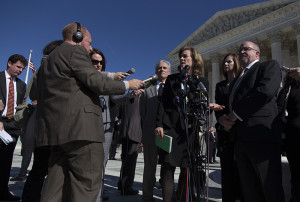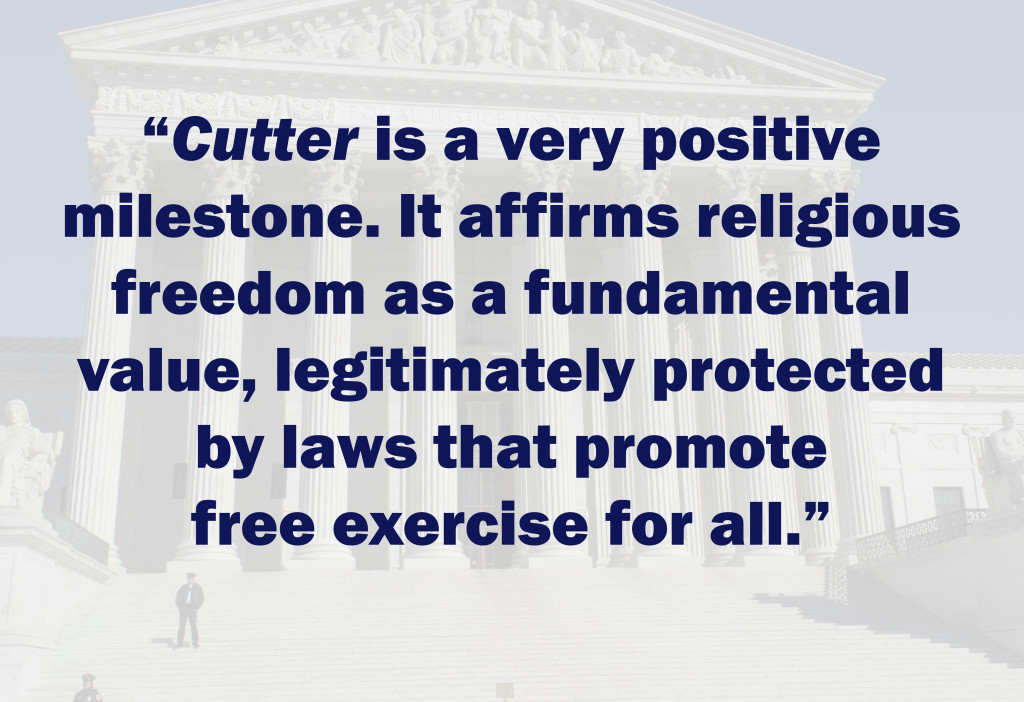Protecting religious practices and freedom of conscience
The First Amendment protects people of any faith and people of no faith to believe how they see fit, and Baptists throughout history have championed the freedom of conscience of all individuals. Freedom of religion goes hand-in-hand with freedom from state-sponsored religion. Just as people of faith and the scions of the Enlightenment joined forces to pass the First Amendment more than two centuries ago, believers and non-believers can work together to protect it today.
The BJC has filed or joined more than 120 friend-of-the-court briefs since 1947. You can visit our litigation page to see our most recent work, but here are three examples specifically dedicated to defending the worship practices and freedom of conscience of atheists and religious minorities.
Town of Greece v. Galloway

General Counsel Holly Hollman speaks to reporters after oral arguments in Town of Greece v. Galloway.
The First Amendment protects the rights of individuals and faith communities to engage in religious worship as a voluntary expression of individual conscience and prohibits the government from appropriating those rights. The BJC filed a friend-of-the-court brief in Town of Greece v. Galloway, opposing the town’s practice of opening municipal meetings with official, sectarian prayer and supporting the position of two residents – one an atheist and one Jewish – who challenged the sectarian government-sponsored prayers as an infringement on their religious liberty rights.
According to the BJC brief, the town’s “practice of beginning a participatory local government meeting with a communal prayer infringes the liberty of conscience of not just religious minorities, but also of Christians who believe that worship should be voluntary.”
The brief also stated that the Founders and our Baptist forebears understood “that prayer is an expression of voluntary religious devotion, not the business of the government.” Because of the passion surrounding religious belief, it is important that everyone’s religious rights are protected and that no one is forced into religious practice.
In a sharply divided 5-4 decision in 2014, the Supreme Court said prayers that open a legislative session may be constitutional, but there are rules against proselytizing and denigrating the faith of others. For more, visit our Greece v. Galloway page.
Cutter v. Wilkinson
In the case of Cutter v. Wilkinson, a group of prisoners practicing various faiths were fighting against prison regulations that denied them access to religious literature and the opportunity to conduct religious services. The prisoners adhered to several different faiths, including Satanist, Wicca and other non-mainstream religions, and the BJC joined a broad coalition of groups in filing a friend-of-the-court brief to protect their right to religious practice and defend statutes that secure that ability. In 2005, the U.S. Supreme Court unanimously agreed that the prisoners had a right to their religious practice in prison, protected by the Religious Land Use and Institutionalized Persons Act (RLUIPA). The decision affirmed the ability of Congress to pass laws that create special protections for the religious practice of institutionalized persons. Read Holly Hollman’s analysis of the decision.
For more on our work in the courts, visit our litigation page.
O Centro Espirita Beneficiente Uniao Do Vegetal v. Gonzales
The BJC joined a friend-of-the-court brief in the case of O Centro Espirita Beneficiente Uniao Do Vegetal v. Gonzales, in support of a religious group (UDV) whose worship includes the central sacrament of ingesting a hallucinogenic tea that is ritually prepared from two plants. A chemical in the tea – called hoasca – is on a list of chemicals regulated by the Controlled Substances Act. In an amicus brief, the BJC and other organizations defended the proper statutory interpretation of the Religious Freedom Restoration Act (RFRA) and its goal of protecting religious liberty for all people, including this group following a religion native to Brazil. The brief argued that, by design, RFRA requires the federal government to demonstrate a compelling interest in restricting the use of hoasca by UDV in particular, not the use of hoasca or other drugs generally.
In 2006, the U.S. Supreme Court unanimously sided with the religious group, saying their right to religious expression and practice superseded federal drug control laws that were enforced against it to confiscate the tea. Read Holly Hollman’s analysis of the decision and its impact.





